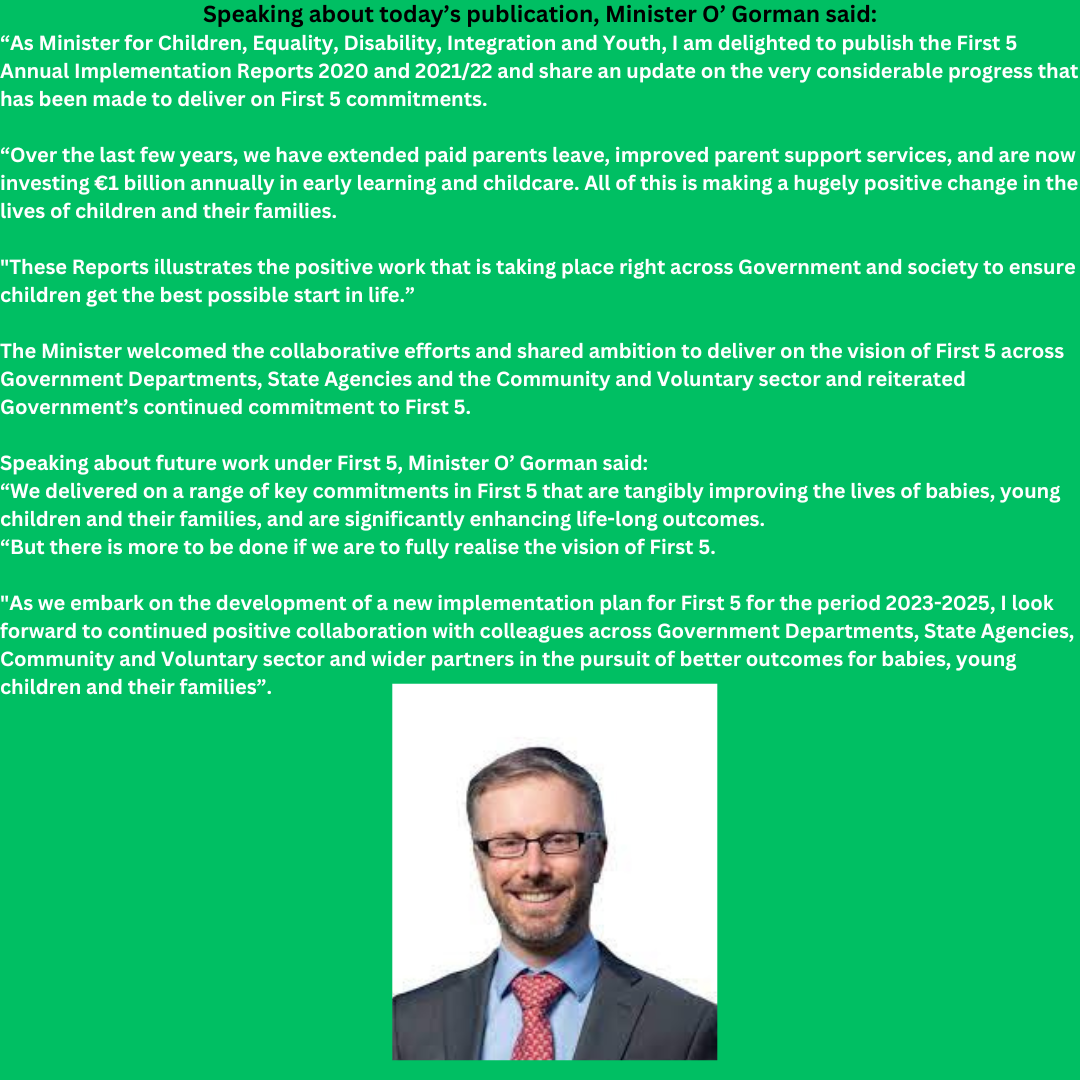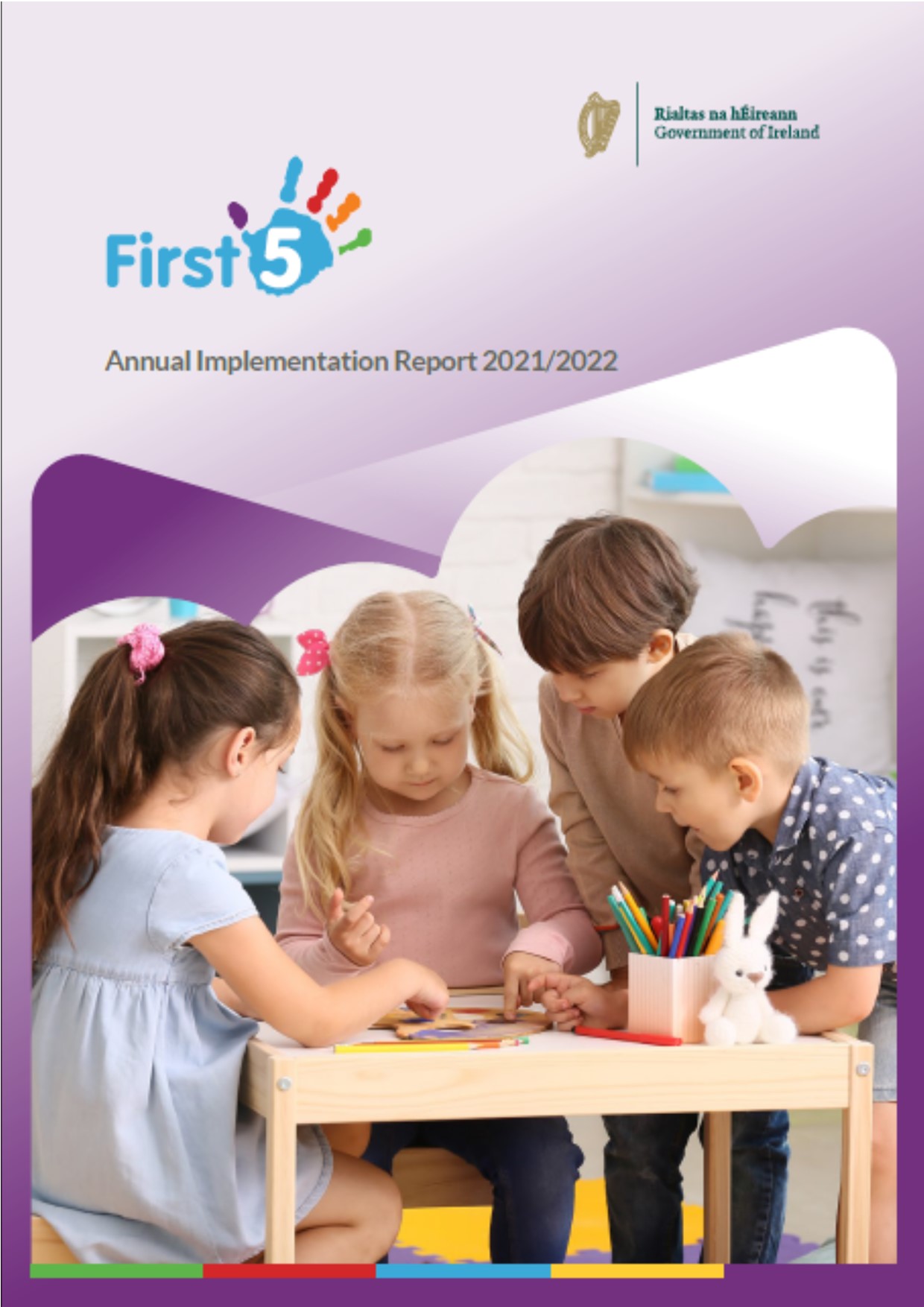From Department of Children, Equality, Disability, Integration and Youth
Published on 15 June 2023
Last updated on 15 June 2023
The Minister for Children, Equality, Disability, Integration and Youth, Roderic O’ Gorman, has today published the Government’s First 5 Annual Implementation Reports 2020 and 2021/22.
First 5, the ten-year Whole-of-Government Strategy for Babies, Young Children and their Families (2019-2028) was published in November 2018 followed by an initial implementation plan for the Strategy in May 2019.
The reports highlight how the interim target set for paid parents leave – of 7 weeks per parent by 2021 – has been reached; the interim target of a 30% graduate early learning and childcare workforce by 2021 exceeded and the investment target for early learning and childcare – of €970 million by 2028 – has been exceeded five years ahead of schedule.
The Report also outlines key achievements over the period 2020 – 2022, including:
- an extension of paid parents leave and extended entitlements to unpaid parent leave;
- the publication of Supporting Parents, A New Model of Parenting Support Services to improve awareness of, and access to, parenting support services;
- a range of new measures to promote healthier childhoods;
- major reforms to the early learning and care system; and
- a range of measures to help families struggling with the cost of living and to reduce the risk of early childhood poverty.
First 5 focuses on the period of early childhood, from the antenatal period to age five, and takes a joined-up, cross-government approach to supporting babies, young children and their families during these critical early years.
An Open Policy Debate on the First 5 Implementation Plan 2023-2025 will take place on 20 June.

Access report here 👇
NOTES
A high-level summary of progress on 2020 and 2021/22 milestones across the First 5 Big Steps are set out below.
i. A broader range of options for parents to balance working and caring
Extended entitlements to paid parents’ leave were announced in 2020. The Family Leave and Miscellaneous Provisions Act 2021 extended the statutory entitlement to paid parents’ leave from three weeks paid leave per parent to five weeks, and extended the period in which leave can be taken from within one year of the child’s birth or adoptive placement to two years. In April 2021, a further three weeks of Parent's Leave and Benefit became available to each parent. In July 2022, Parents’ Leave and Benefit increased by a further two weeks, bringing the current entitlement to seven weeks which meets the First 5 target.
The Family Leave and Miscellaneous Provisions Act 2021 also amended the Adoptive Leave Act 1995 to enable adoptive couples to choose which parent may avail of adoptive leave and, in doing so, rectified an anomaly in the legislation that left married male same-sex couples unable to avail of adoptive leave.
Furthermore, the phased introduction of an additional eight weeks unpaid parental leave commenced in 2019, and rose from 22 to 26 working weeks in September 2020. The leave is available to a 'relevant parent' of a child, which is defined in the 1998 Act as a parent, an adoptive parent, or a person acting in ‘loco parentis’.
A General Scheme of the Work Life Balance and Miscellaneous Provisions Bill, which transposes provisions of the EU Directive (2019/1158) on work life balance for parents and carers, was published in April 2022 and referred to the Joint Committee on Children, Equality, Disability, Integration and Youth for Pre-legislative Scrutiny. The Joint Committee issued its Report on Pre-Legislative Scrutiny on 9 June 2022 and the Work Life Balance and Miscellaneous Provisions Bill 2022 was published on 5 October 2022.
The Work Life Balance and Miscellaneous Provisions Bill, which incorporates the Right to Request Remote Working Bill, will introduces a range of measures to improve family-friendly work practices and support women in the workforce including:
- A right to request flexible working arrangements for caring purposes, for parents and carers;
- A right to request remote working for all workers;
- A right to leave for medical care purposes, both for employees with children up to age 12 and carers; and
- Extension of the current entitlement to breastfeeding/lactation breaks from six months to two years.
The Work Life Balance and Miscellaneous Provisions Bill has passed all Stages in the Oireachtas in 2023 and was enacted on the 4th of April 2023 as the Work Life Balance and Miscellaneous Provisions Act 2023.
ii. A new model of parenting support.
The development of a national model of parenting support services began in 2020, led by the Parenting Support Policy Unit in DCEDIY, in partnership with Tusla, the HSE, and other partners from the community and voluntary sector. Supporting Parents: A National Model of Parenting Support Services was launched in 2022. Supporting Parents aims is to develop a more coherent and strategic approach to the development and delivery of parenting support services so that all parents can access the support they need when they need it.
Plans to consolidate, streamline, and strengthen parenting information resources into a single, coherent platform were brought forward due to the Covid-19 pandemic, with the launch of the ‘Parents’ Centre’ platform in April 2020 on gov.ie. Subsequently the Parents’ Centre platform has been merged with the ‘Supporting Children and Parents’ platform, which launched in 2022 and brings together new and existing resources that parents may find helpful. The platform also includes resources for Ukrainian parents in Ireland.
Additionally, two informational social media campaigns were conducted in 2020. The national public information campaign on positive parenting originally scheduled for 2020 was delayed to prioritise other projects in response to the Covid-19 pandemic. This campaign was successfully run in 2021.
iii. New developments in child health
A Steering Group was established by the Department of Health in 2019 to commence work on a dedicated child health workforce - one of the major commitments of First 5. As a result of the re-prioritisation of work in light of the Covid-19 pandemic, the work on the establishment of a dedicated child health workforce did not progress. However, the Department has recommenced this important work.

